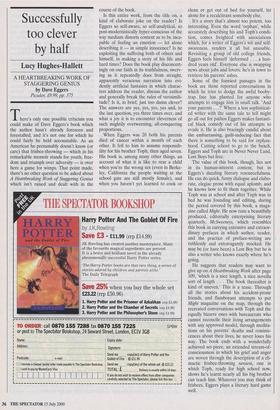Successfully too clever by half
Lucy Hughes-Hallett
A HEARTBREAKING WORK OF STAGGERING GENIUS by Dave Eggers Picador, £9.99, pp. 375 There's only one possible criticism you could make of Dave Eggers's book which the author hasn't already foreseen and forestalled, and it's not one for which he could fairly be held accountable. As an American he presumably doesn't know (or care) that frisbee-throwing — which in his remarkable memoir stands for youth, free- dom and triumph over adversity — is over here a game for wimps. That point made, there's no other question to be asked about A Heartbreaking Work of Staggering Genius which isn't raised and dealt with in the
course of the book.
Is this entire work, from the title on, a kind of elaborate joke on the reader? Is Eggers so self-aware, so self-analytical, so post-modernistically hyper-conscious of the way medium distorts content as to be inca- pable of feeling an emotion — let alone describing it — in simple innocence? Is he exploiting the suffering both of others and himself, in making a story of his life and hard times? Does the book play disconcert- ingly on our faith in its truthfulness, swerv- ing as it repeatedly does from straight, apparently veracious narration into evi- dently artificial fantasies in which charac- ters address the reader, discuss the author and generally break the rules of verisimili- tude? Is it, in brief, just too damn clever? The answers are yes, yes, yes, yes and, to the last question, yes three times over, and what a joy it is to encounter cleverness of such mightily overweening, all-conquering proportions.
When Eggers was 20 both his parents died of cancer within a month of each other. It fell to him to assume responsib- ility for his brother Toph, then aged seven. His book is, among many other things, an account of what it is like to rear a child when you're the wrong sex (even in Berke- ley, California the people waiting at the school gate are still mostly female), and when you haven't yet learned to cook or clean or get out of bed for yourself, let alone for a recalcitrant somebody else.
It's a story that's almost too potent, too interesting. Even the word 'orphan', while accurately describing his and Toph's condi- tion, comes freighted with associations which, for a writer of Eggers's wit and self- awareness, renders it all but unusable. Revisiting a group of old college friends, Eggers feels himself 'deformed . . . a hun- dred years old'. Everyone else is swapping news about jobs and lovers: he's in town to retrieve his parents' ashes.
Some of the funniest passages in the book are those reported conversations in which he tries to dodge the awful booby- trap fate has planted for anyone who attempts to engage him in small talk. 'And your parents. .?' Where a less sophisticat- ed writer with the same tale to tell might go all out for pathos Eggers makes fantasti- cal black comedy out of his attempts to evade it. He is also bracingly candid about the embarrassing, guilt-inducing fact that there is something to be said for orphan- hood. Cutting school to go to the beach, Eggers and Toph are in Never Never Land, Lost Boys but free.
The value of this book, though, lies not in its human-interest content, but in Eggers's dazzling literary resourcefulness. He can do quick, funny dialogue and elabo- rate, elegiac prose with equal aplomb, and he knows how to fit them together. While Toph was at school and after Toph was in bed he was founding and editing, during the period covered by this book, a maga- zine called Might. He now runs a beautifully produced, editorially enterprising literary quarterly, McSweeneys, which resembles this book in carrying extensive and extraor- dinary prefaces in which author, reader, and the practice of preface-writing arc ruthlessly and extravagantly mocked. He may be (or have been) a Lost Boy but he is also a writer who knows exactly where he's going.
He suggests that readers may want to give up on A Heartbreaking Work after page 109, 'which is a nice length, a nice novella sort of length . . . The book thereafter is kind of uneven.' This is a tease. Through all the stories about his accident-prone friends, and flamboyant attempts to put Might magazine on the map, through the recreated conversations with Toph and the equally bizarre ones with bureaucrats who cannot reconcile their living arrangements with any approved model, through medita- tions on his parents' deaths and reminis- cences about their lives, he never loses his way. The book ends with a wonderfully achieved set-piece, an extended stream-of- consciousness in which his grief and anger are woven through the description of a cli- mactic frisbee-throwing session, one in which Toph, ready for high school now, shows he's learnt nearly all his big brother can teach him. Whatever you may think of frisbees, Eggers plays a literary hard game well.


























































 Previous page
Previous page